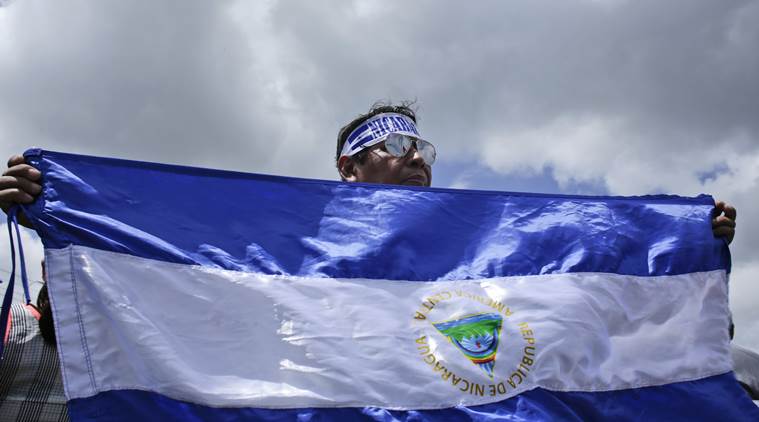Nicaragua President rejects early elections, US rebukes crackdown
Daniel Ortega said there is no sense in holding early elections as the opposition would not accept an unfavourable result.

A man holds a Nicaraguan national flag during a demonstration demanding the resignation of President Daniel Ortega. (AP Photo)
Nicaraguan President Daniel Ortega on Monday rejected the idea of calling a referendum on whether to hold an early election, while the United States said it was revoking visas of Nicaraguan officials connected to a crackdown on protesters.
Ortega has faced growing international condemnation for heavy-handed deployment of police and armed pro-government civilians to squash the unrest, which led to nearly 300 deaths and many more people injured since protests began three months ago.
1m 17s
In an interview with CNN en Español broadcast on Monday, Ortega rejected the idea of a referendum on holding early elections in a bid to calm opposition against him.
“There is no sense in an early election,” he said, suggesting the opposition would not accept an unfavourable result. The next presidential election is due in late 2020.
Still, Ortega said he was keen to restart dialogue, following a lull in clashes after security forces flushed protesters from strongholds in a lethal offensive earlier this month.
“We are going to see how to create the conditions to strengthen the dialogue commission and (have) this help us have good results,” he said.
“We have been in touch with the Secretary General of the United Nations and with different international organizations and with Cardinal (of Nicaragua Leopoldo) Brenes,” he said.
Earlier on Monday, the White House said it was revoking or restricting US visas of Nicaraguan officials connected to the violence against protesters, the latest of several moves to ratchet up pressure from Washington on Ortega’s government.
“The United States strongly condemns the ongoing violence in Nicaragua and human rights abuses committed by the Ortega regime in response to protests,” the White House said in a statement.
The US government has also secured the return of vehicles donated to the Nicaraguan national police that have been used to suppress the protesters and cut off additional sales and donations of equipment that might be used against protesters, it said.
The demonstrations were triggered by a plan by the government to trim pension benefits. The government’s response sparked a wider protest against Ortega that he has labelled a conspiracy to topple his elected government.
The White House described the Nicaraguan protests as demanding democratic reforms after years of fraudulent elections and repression of opposition parties and independent media.
“These demands have been met with indiscriminate violence, with more than 350 dead, thousands injured, and hundreds of citizens falsely labelled ‘coup-mongers’ and ‘terrorists’ who have been jailed, tortured, or who have gone missing,” it said.
Nicaraguan human rights group CENIDH said 295 people have died in the violence, while other rights groups talk of up to 485 people killed.
Ortega, whose reaction to the protests has been compared to Anastasio Somoza, the dictator he helped topple in 1979, said 195 people have died.
“Human rights organizations are politicized, have a systematic policy against the government and push people to file complaints. They invent anything,” said Ortega.
Washington blamed Ortega, a former Marxist guerrilla leader, and his wife, Vice President Rosario Murillo, for the situation.
Last month, the United States imposed sanctions against three top Nicaraguan officials, citing human rights abuses.
“These are a start, not an end, of potential sanctions,” the White House said.
Ortega, who ruled the country from 1979 to 1990, has held elected office as president since 2007. The current violence comes after years of calm in Nicaragua and is the worst since his Sandinista movement battled US-backed “Contra” rebels in the 1980s.







































No hay comentarios:
Publicar un comentario